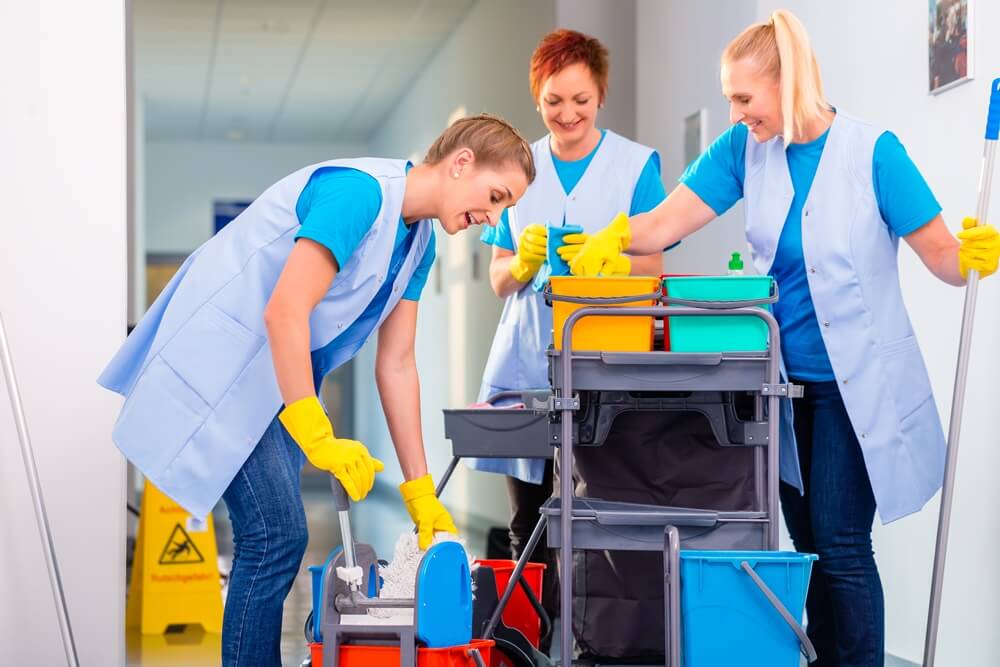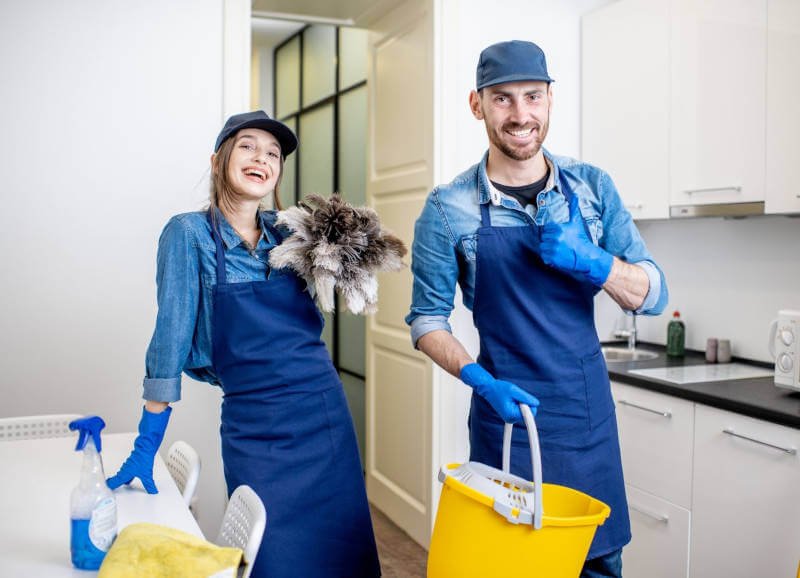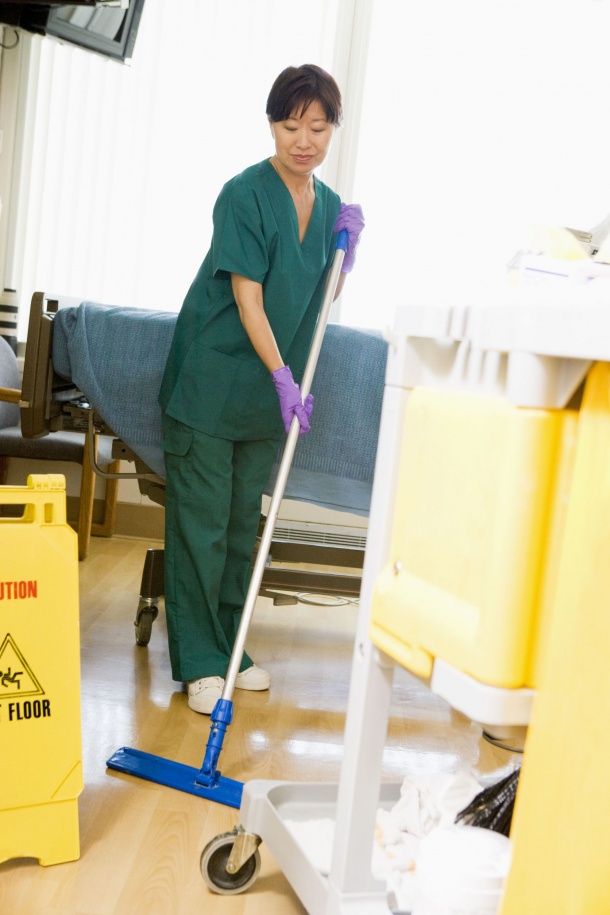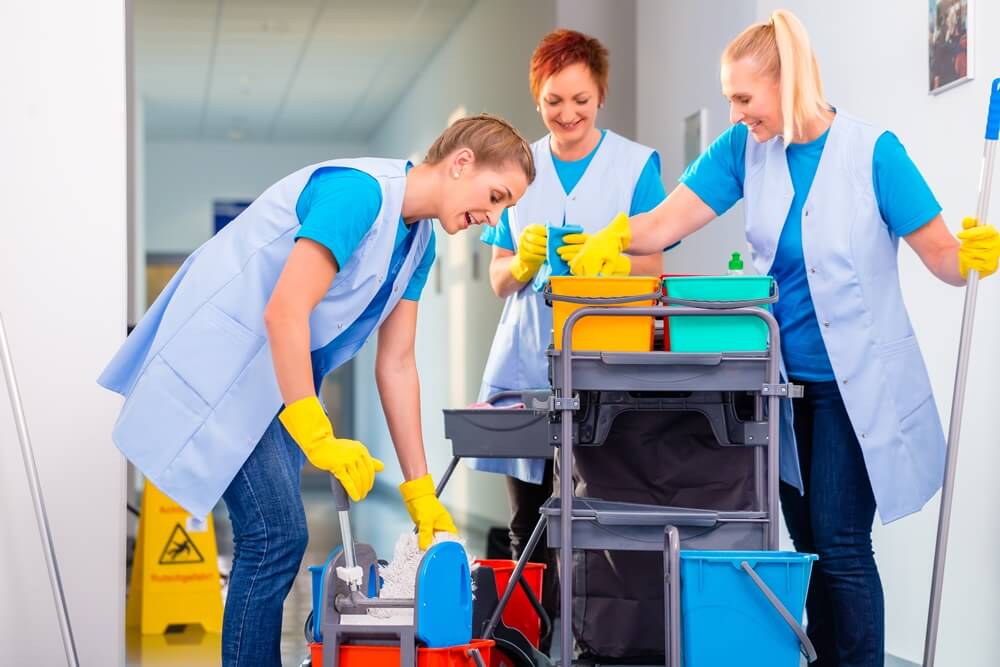Being a cleaner may seem like an effortless job, but behind the scenes, there lies a world of hard work and dedication. From scrubbing floors to dusting every nook and cranny, cleaners put in their best effort to ensure every space is spotless. They may work long hours, often bending and stretching to reach even the most inaccessible corners. So, let’s peel back the layers and discover the true challenges that come with being a cleaner.

This image is property of linkinglines.com.
Physical Demands
Strength and stamina
Being a cleaner requires a certain amount of physical strength and stamina. You will often find yourself needing to lift heavy objects, such as trash bags or cleaning equipment. Additionally, moving furniture or lifting heavy mops and buckets may be necessary in order to thoroughly clean different areas. It is important to maintain your strength and build up your physical endurance in order to meet the demands of the job.
Repetitive motions
As a cleaner, you will often find yourself performing repetitive motions throughout the day. Whether it’s sweeping, mopping, or scrubbing, these tasks can take a toll on your joints and muscles. It is important to practice proper body mechanics and take regular breaks to prevent strains and injuries. Incorporating stretching exercises into your daily routine can also help to alleviate muscle tension and reduce the risk of repetitive strain injuries.
Awkward positions
Cleaning often requires getting into tight spaces and awkward positions. Whether it’s cleaning under furniture or reaching high surfaces, these positions can put a strain on your body. It is important to be mindful of your posture and take breaks to stretch and relax your muscles. Using ergonomic tools and equipment can also help to minimize the strain on your body and make your job easier and more comfortable.
Work Environment
Exposure to chemicals and toxins
As a cleaner, you may be exposed to a variety of chemicals and toxins while performing your duties. Cleaning agents, disinfectants, and other chemicals used in the cleaning process can potentially be harmful if not used properly. It is important to familiarize yourself with the proper handling and storage of these substances, as well as using personal protective equipment such as gloves and masks.
Noise and distractions
Cleaning can often take place in noisy and busy environments, such as office buildings or public spaces. This can make it difficult to concentrate on your tasks and may increase your stress levels. It is important to find ways to cope with noise and distractions, such as using noise-canceling headphones or finding quieter areas to focus on your work. Finding a balance between being aware of your surroundings and focusing on your tasks can help to improve your productivity and overall job satisfaction.
Working alone or in teams
The nature of cleaning work can vary depending on the specific job and environment. Some cleaners may work alone, while others may work as part of a team. Both scenarios have their own advantages and challenges. When working alone, you have the autonomy to set your own pace and schedule. However, it can sometimes feel isolating and you may be responsible for managing all aspects of the job. Working in a team can provide support and camaraderie, but it may also require effective communication and coordination. It is important to adapt to different work environments and find ways to make the most of your circumstances.

This image is property of rednaxrecruitment.com.au.
Time Management
Productivity expectations
As a cleaner, you will be expected to meet certain productivity expectations. This means completing your cleaning tasks within a specific timeframe while maintaining high-quality standards. It is important to prioritize tasks, plan your schedule efficiently, and use your time effectively. Developing time management strategies and finding ways to streamline your workflow can help you meet productivity expectations and reduce stress.
Strict schedules and deadlines
In addition to productivity expectations, cleaners often have strict schedules and deadlines to adhere to. Whether it’s cleaning offices before employees arrive in the morning or ensuring public areas are clean before opening hours, time constraints are a common part of the job. It is important to be punctual, organized, and adaptable in order to meet these deadlines. Being able to work efficiently under pressure and effectively manage your time will contribute to your success as a cleaner.
Managing multiple tasks
Cleaning often involves juggling multiple tasks at once. From vacuuming and dusting to disinfecting and organizing, there is a wide range of responsibilities that need to be addressed. It is important to develop effective multitasking skills and prioritize tasks based on their urgency and importance. Creating an organized cleaning routine and maintaining clear communication with clients or supervisors can help ensure that all tasks are completed in a timely manner.
Cleaning Techniques
Learning and mastering various techniques
Being a cleaner involves more than just wiping surfaces and mopping floors. It requires a good understanding of different cleaning techniques and methodologies. From the proper way to sanitize bathrooms to the best approach for cleaning delicate surfaces, there are various techniques that must be learned and mastered. Taking the time to educate yourself on different cleaning methods and staying updated on industry best practices will make you a more effective and knowledgeable cleaner.
Using specialized equipment
Cleaning often requires the use of specialized equipment and tools. From industrial-strength vacuum cleaners to floor scrubbers and pressure washers, these tools can make your job easier and more efficient. However, it is important to learn how to properly use and maintain these machines in order to ensure their effectiveness and longevity. Familiarize yourself with the manufacturer’s instructions and seek training if needed to become proficient in using specialized equipment.
Dealing with different types of surfaces
As a cleaner, you will encounter a wide range of surfaces that require different cleaning methods. From carpets and hardwood floors to stainless steel fixtures and glass windows, each surface requires specific care and attention. It is important to understand the properties of different materials and use the appropriate cleaning products and techniques to avoid damage. Being knowledgeable about surface-specific cleaning methods will help you achieve optimal results and maintain the longevity of various materials.

This image is property of www.europeancleaningjournal.com.
Health and Safety
Avoiding accidents and injuries
The safety of both yourself and others is of utmost importance when working as a cleaner. There are many potential hazards that can pose risks, such as wet floors, slippery surfaces, or exposure to harmful chemicals. It is crucial to follow safety protocols and guidelines to minimize the risk of accidents or injuries. This includes wearing appropriate personal protective equipment, using caution signs, and implementing proper cleaning procedures to maintain a safe working environment.
Preventing the spread of germs
A key responsibility of a cleaner is to maintain a clean and hygienic environment. This includes preventing the spread of germs and infectious diseases. Regular handwashing, using disinfectants, and properly sanitizing high-touch surfaces are essential practices to minimize the transmission of bacteria and viruses. Staying up-to-date with effective cleaning and sanitizing protocols, especially during times of public health concerns, is crucial to ensure the safety and well-being of both yourself and those you serve.
Following safety protocols
In addition to the specific safety measures related to cleaning tasks, it is important to familiarize yourself with general safety protocols. This includes correctly handling and storing cleaning chemicals, using ladders and equipment safely, and practicing good ergonomics to reduce the risk of strains and injuries. Following safety protocols not only protects yourself but also those around you, ensuring a safe and healthy work environment.
Dealing with Difficult Situations
Handling hazardous waste
In certain cleaning environments, such as healthcare facilities or industrial settings, you may come across hazardous waste that requires special handling and disposal. This can include sharp objects, chemicals, or biohazardous materials. It is crucial to receive proper training and certification to handle these materials safely. Following established procedures for containment, removal, and disposal of hazardous waste is essential to protect yourself and prevent harm to others.
Cleaning up after accidents
Accidents happen, and as a cleaner, you may be called upon to clean up after incidents such as spills, leaks, or other messes. It is important to have the knowledge and resources to respond quickly and effectively in such situations. This may involve using absorbent materials, specialized cleaning products, or following specific protocols to ensure proper cleanup and safety. Being prepared and able to handle unexpected incidents demonstrates your professionalism and contributes to maintaining a clean and safe environment.
Managing challenging clients
Interacting with clients can sometimes be challenging, especially in circumstances where they may be dissatisfied with the cleaning services provided. It is important to remain calm and professional when faced with difficult situations or demanding clients. Active listening, effective communication, and problem-solving skills are key in resolving issues and maintaining positive client relationships. Adapting to different personalities and addressing concerns promptly and efficiently will contribute to your success as a cleaner.

This image is property of maidsailors.com.
Emotional and Mental Toll
Exposure to distressing and unpleasant sights
As a cleaner, you may come across distressing or unpleasant sights during your work. This can include blood or bodily fluids, extensive dirt and grime, or scenes of disarray. It is important to be mentally prepared for such encounters and find ways to cope with any emotions that may arise. Engaging in self-care practices, utilizing support networks, and seeking professional assistance if needed can help manage the emotional toll that cleaning work can sometimes have.
Dealing with criticism and complaints
Like any profession, cleaners may face criticism or complaints from clients or supervisors. It is important to remember that feedback is an opportunity for growth and improvement. Take critiques constructively, and use them as an opportunity to enhance your skills and performance. Addressing concerns in a professional and empathetic manner shows your commitment to providing excellent service and maintaining client satisfaction.
Maintaining a positive attitude
The nature of cleaning work can be physically demanding and mentally draining at times. However, maintaining a positive attitude is essential in providing the best service possible. Finding joy and satisfaction in the immediate impact of your work, such as witnessing a clean and organized space, can help to foster a positive mindset. Celebrate your accomplishments, practice gratitude, and surround yourself with a supportive network to uplift your spirits and maintain a positive outlook.
Perception and Recognition
Underappreciation and undervaluing of the job
Cleaning is a profession that is often underappreciated and undervalued. The hard work and dedication involved in maintaining clean and sanitized environments can sometimes go unnoticed. It is important to recognize the value of your work and the positive impact you have on the health and well-being of others. Educating others about the significance of cleaning and raising awareness about the importance of your role can help combat underappreciation and elevate the status of the profession.
Lack of recognition and rewards
Cleaners may often find themselves lacking recognition and rewards for their efforts. It is important to advocate for yourself and seek opportunities to be acknowledged for your hard work. Proactively communicate your accomplishments to supervisors or clients and highlight the positive outcomes that result from your cleaning efforts. Additionally, participating in professional organizations or pursuing certifications can help gain recognition and open doors to career advancement opportunities.
Changing public perception
Public perception of cleaning as a profession is evolving, especially in light of recent public health concerns. The importance of cleanliness and sanitation has been brought to the forefront, highlighting the critical role that cleaners play in maintaining safe environments. As a cleaner, you have the opportunity to change public perception by showcasing the professionalism and expertise that goes into your work. Educating others about the importance of cleanliness and hygiene can lead to a greater appreciation for the profession and its impact on society.

This image is property of www.cleanmyspacect.com.
Career Advancement and Training
Limited opportunities for growth
Career advancement opportunities in the cleaning industry can sometimes be limited. However, this does not mean that there are no paths for growth. Opportunities for advancement may vary depending on the specific organization or industry you work in. It is important to advocate for yourself, seek additional responsibilities or projects, and express your career goals to supervisors or mentors. Taking on additional training or certifications can also demonstrate your commitment to professional growth and open doors to new opportunities.
Continual learning and specialty training
To stay current and relevant in the cleaning industry, continual learning is key. Cleaning techniques, products, and equipment are constantly evolving, and it is important to keep up with industry trends. Pursuing specialty training in areas such as green cleaning, infection control, or specific cleaning methodologies can distinguish you as a knowledgeable and skilled cleaner. Embracing a mindset of lifelong learning will not only enhance your expertise but also contribute to your personal and professional growth.
Developing new skills
Cleaning is a diverse profession that requires a wide range of skills. In addition to technical cleaning skills, developing other skills, such as communication, problem-solving, or leadership skills, can greatly benefit your career. These transferrable skills can open doors to different roles within the cleaning industry or even outside of it. Seeking opportunities to develop and refine these skills, such as participating in workshops or taking on additional responsibilities, can broaden your career prospects and increase your value as a professional cleaner.
Personal Satisfaction
Seeing the immediate impact of your work
One of the most rewarding aspects of being a cleaner is witnessing the immediate impact of your work. Walking into a dirty space and leaving it clean, organized, and germ-free can bring a sense of fulfillment and satisfaction. The tangible results of your efforts can provide a strong sense of pride and motivate you to continue making a difference in the spaces you clean. Embrace the satisfaction that comes from a job well done and remember the positive impact you are making on those who inhabit the spaces you clean.
Creating clean and organized spaces
Beyond the immediate impact, cleaners have the unique ability to create clean, organized, and inviting spaces. Clean environments promote productivity, well-being, and a positive mindset. Whether it’s an office, a healthcare facility, or a residential space, your work as a cleaner contributes to the overall experience and comfort of the individuals who occupy these spaces. Take pride in your ability to transform spaces into clean and inviting havens, and recognize the value you bring to those you serve.
Building rapport with clients
As a cleaner, you have the opportunity to build rapport and establish relationships with clients. Whether it’s regular interactions with individuals in a specific office or working in someone’s home, these relationships can contribute to personal satisfaction. Positive interactions with clients can create a sense of camaraderie, trust, and appreciation for your work. Building strong professional relationships can lead to not only repeat business but also a sense of fulfillment and purpose in your role as a cleaner.
